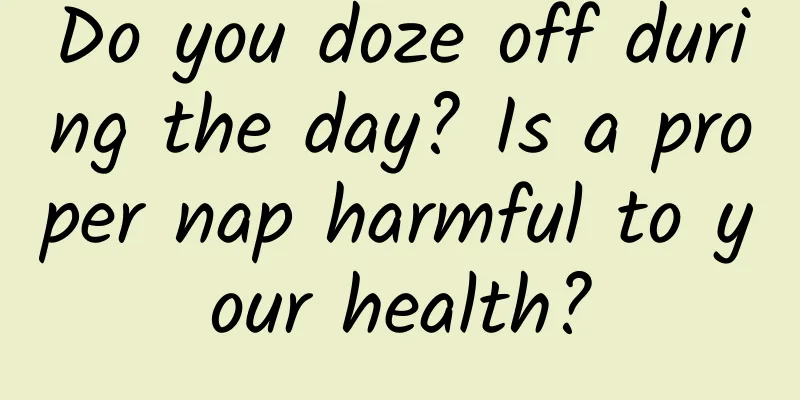Do you doze off during the day? Is a proper nap harmful to your health?

|
For some people, nothing is more refreshing than a nap. According to the National Sleep Foundation, a US nonprofit, about a third of American adults take a nap every day, and in some countries — such as Spain, Italy, Mexico and Greece — taking a quick nap is a cultural tradition that dates back centuries. But are naps actually good for you? There's nothing wrong with naps per se, however needing to sleep a lot during the day may be a sign that a person isn't getting enough quality sleep at night. According to the National Sleep Foundation, most adults need seven to nine hours of sleep per night. Image source: Pixabay If you need to take multiple naps during the day, despite having adequate sleep opportunities at night, this may be a sign that you are not getting enough sleep or that your sleep quality is poor. People take 20-minute naps when needed, but also caution against long or frequent naps because they may affect the ability to sleep longer at night. Napping is natural, normal, and generally good for you. The director of the Sleep and Performance Research Center at Washington State University agreed, but noted that napping could also be a sign of potential health problems. If someone has adequate nightly sleep opportunities but finds that supplemental naps are necessary to stay alert and healthy, this could be a sign that their nightly sleep is not restorative enough. For example, sleep apnea is a condition in which people experience pauses or shallow breathing during sleep. This can lead to daytime fatigue and make people more likely to take a midday nap. It’s also worth noting that people who nap more frequently in addition to adequate nighttime sleep have been found to have higher mortality rates in observational studies. A 2019 study published in the European Heart Journal found that daytime napping was associated with an increased risk of major cardiovascular events and death in people who slept more than six hours a night, but not in those who slept less than six hours a night. If nighttime sleep is limited for other reasons, [such as] occasional interruptions to nighttime sleep due to work, then naps are generally a good thing [and] restorative, however, too much sleep appears to be harmful. This is called hypersomnia, a neurological disorder of excessive sleep or excessive sleepiness. 1. What is the purpose of taking a nap? Sleep, no matter how long it is, provides a cool-down period for the brain. There are changes in the electrical activity of brain waves and there may even be a toxin flush, which can be seen during longer sleep periods. A 2019 study published in the journal Science found that during sleep, the brain uses a mixture of cerebrospinal fluid (a clear, colorless fluid that flows in and around the brain and spinal cord) and blood to cleanse itself. This process is thought to remove toxins and waste proteins that build up in the brain during the day, essentially leaving the brain refreshed upon waking. Additionally, a 2021 study published in the International Journal of Environmental Research and Public Health found that afternoon naps can improve cognition and alertness for about two hours after the nap. In particular, afternoon naps tend to be more effective in improving cognition. 2. How much sleep should you get? While naps can be restorative, they can have different effects depending on why you’re napping, said Carolyn Miller, emeritus professor of psychology at Loughborough University in the United Kingdom. For example, when people don’t necessarily feel sleep-deprived or tired, napping can still promote health. One could call this behavior “napping with appetite.” On the other hand, when a person is sleep-deprived, “compensatory napping” can help recalibrate levels of a molecule called adenosine. Lower adenosine levels promote alertness, while higher adenosine levels promote sleepiness. While some naps are beneficial, others can leave people feeling stale. This is called sleep inertia, a physiological state of impaired cognitive performance that can occur during nighttime sleep and immediately after a nap. Image source: Pixabay After waking up from any sleep period, there is a temporary feeling of grogginess, disorientation, and decreased alertness that takes a while—usually about 15 minutes—to dissipate. This is not usually a problem when people have time to let sleep inertia pass, but it can be a problem for those who are on call or need to be at their best alert immediately after waking up, which is often the case with people who take naps. For people with chronic insomnia, sleep inertia can make symptoms worse, and daytime naps are not recommended. For those without chronic insomnia, naps of 30 minutes or less tend to be less likely to cause sleep inertia. When a person sleeps for more than 30 minutes, they are more likely to enter deeper levels of sleep. As with sleep inertia, waking up during these stages can also make people feel groggy, drowsy, disoriented and confused, so sleeping for around 20 minutes before 3pm is ideal, and any later may affect nighttime sleep. But “30 minutes or less” isn’t a hard and fast rule. In some cases, longer naps of about 1.5 hours may also be beneficial, allowing the body to cycle through the stages of sleep and avoid interrupting deep sleep. Such longer naps may be particularly helpful for first responders and shift workers who are trying to avoid fatigue and have to deal with reduced opportunities for adequate sleep. Source: Chongqing Tianji Network Co., Ltd. Source: Kopbanan Statement: Except for original content and special notes, some pictures are from the Internet. They are not for commercial purposes and are only used as popular science materials. The copyright belongs to the original authors. If there is any infringement, please contact us to delete them. |
<<: Does drinking tea really help digestion?
Recommend
Can I have sex with 3rd degree cervical erosion?
As the stress of modern life continues to increas...
Why eat dietary fiber to cause constipation? Which foods contain more dietary fiber?
We often hear that eating more foods rich in diet...
Can I eat cucumbers during my menstrual period?
I'm sure everyone often eats vegetables such ...
Beware! Taking cold medicines together may pose a big risk
Recently, respiratory diseases have become preval...
What does it mean to dream about doing hair?
In daily life, when most people go to a hair salo...
If you have these 4 symptoms after getting up in the morning, your blood lipids may be high! It is especially dangerous after the age of 40!
According to the data of "China Blood Lipid ...
Is the body temperature high or low before ovulation?
If female friends want to get pregnant immediatel...
High follicle stimulating hormone
Follicle-stimulating hormone is a particularly im...
What to do if you have fever and sweat during menopause
If women may experience mental anxiety and depres...
Leucorrhea has a strong smell and you can smell it yourself
Leucorrhea is a normal secretion from the female ...
What to do if your ovaries are enlarged
If your ovaries are enlarged, you must go to the ...
A young man born after 1995 waited for more than six years and successfully donated bone marrow. Does bone marrow donation require extraction of bone marrow?
Science Fiction Network, February 9 (Xu Mingyang)...
When does breast development stop?
Breast development: When girls rapidly reach pube...
There is a lump in the breast and it hurts
The presence of lumps in the breast may be a symp...
Prevention and recovery of episiotomy during childbirth
Many women who give birth naturally need episioto...









